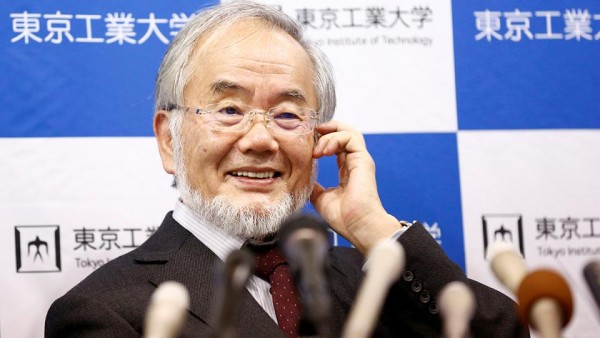But who is he? And what is autophagy and why is it so important?
Here is the who, what, why, where and when in a Euronews easy read.
Who is Yoshinori Ohsumi?
- Japanese cell biologist
- Professor at Tokyo Institute of Technology’s Frontier Research Center
- Born February 9, 1945 (age 71)
- Awarded Ph.D from University of Tokyo in 1974
- Established a research lab in 1988
- The fourth Japanese scientist to win the Nobel Prize for medecine
- He will get 8m Swedish kronor (just over 800,000 euros) for his prize
What is autophagy?
It is the process by which cells recycle their contents.
It comes from the Greek words “auto” (self) and “phagy” (eating).
In layman’s terms, how cells absorb the components they no longer need.
“This concept first emerged during the 1960’s, when researchers first observed that the cell could destroy its own contents by enclosing it in membranes forming sacklike vesicles that were transported to a recycling compartment called the lysosome for degradation,” the Nobel Assembly said in awarding the prize.
Why did Dr Ohsumi win?
He was the first to identify the process of autophagy, back in 1988.
Using baker’s yeast cells in his experiments, he discovered how cells control the process for themselves, identified what genes are involved and what happens when something goes wrong with the process.
Experts say discovery is fundamental to human cell survival.
Why is Dr. Ohsumi’s research important?
The Nobel Assembly says the research has created a new paradigm in our understanding of how the cell recycles its content.
Dr. Ohsumi’s work has increased our understanding of the role of autophagy in many physiological processes, for example in the adaptation to starvation or response to infection.
Mutations in autophagy genes can cause disease.
Disruptions in the process have been linked to Parkinson’s disease, Type 2 diabetes and cancer. (Euronews)
Did you know?
- 107 Nobel Prizes in Physiology or Medecine were handed out between 1901 and 2016
- 89 have been individual winners
- 12 laureates have been women
- 58 – the average age of the laureates
- 32 was the age of the youngest laureate – Frederick G. Banting in 1923 for the discovery of insulin
- 87 is the oldest – Peyton Rous for the discovery of tumour-inducing viruses in 1966
Find out more here:
http://www.nobelprize.org/nobel_prizes/medicine/laureates/2016/advanced-medicineprize2016.pdf
http://www.nytimes.com/2016/10/04/science/yoshinori-ohsumi-nobel-prize-medicine.html?_r=0
https://www.nobelprize.org/nobel_prizes/facts/medicine/index.html

 (Copia).jpg)


